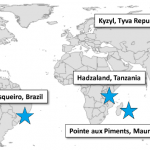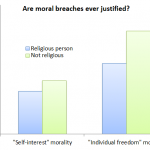In the previous post I wrote about new research linking income inequality to religious attendance. The supposition is that the stresses and bad social conditions that are often found in nations with high inequality goad people into church. It also seems to make them generally more religious.
But hang on! Perhaps that’s back to front. Perhaps, in fact, religion causes inequality. Plenty of people think that’s the case, and there’s some good scientific theories which suggest it should do exactly that. There’s also evidence that belief in God and belief in government are alternative reactions to conditions of uncertainty. And David Stasavage at NYU has shown that non-religious people are more likely to favour government welfare schemes.
So does religion help to explain national differences in income inequality? The unfortunate truth is that right now it’s not possible to tell. There simply aren’t enough good-quality historical data to decide whether changes in religiosity come first, before changes in inequality.
However, it’s still possible to have a crack at putting the theory on a slightly more rigorous footing by using multivariate analysis. In other words, look at the correlation between religion and inequality while adjusting for the other factors that also cause inequality.
The only analysis of this type that I’m aware of was published last year in a student-run journal, the Journal of Politics and International Affairs. The author, Priyanka Palani, controlled for the numbers of elderly people in a nation, as well as education, GDP and whether the nation has an advanced economy (according to the IMF). The correlation with income inequality remained significant.
Well, that’s interesting but I don’t find it too convincing. The problem is that there are many other factors that affect income inequality that weren’t included in the model. Here are a few that I am aware of:
- GDP: richer countries have more spare cash to spend on welfare.
- GDP growth rate: high economic growth (independent of actual GDP) is supposed to reduce inequality.
- Proportional representation: democracies with PR are more likely to elect left-wing governments than democracies that used a ‘first past the post’ system. The reasons are complex, but have to do with the way political parties can build coalitions.
- Migration: high numbers of economic migrants increase inequality, because they are prepared to work for lower wages than the locals.
- Working-age population: nations with a demographic ‘hump’ (i.e. a baby boom) experience low inequality when that hump is at employment age, and higher inequality when they retire.
- Ethnic fractionalisation: people are less likely to support government welfare if they think that the money is going to go to people from different ethnic groups.
- Trade openness: dropping trade barriers increases income inequality.
I put all these factors into a model, correlating them with prayer frequency (which I previously found to be strongly related to income inequality).
With 54 nations in the analysis, the only factor that correlated with inequality was religion! None of the others had any effect.
However, that’s probably because poorer countries operate on different economic rules than rich ones do. So I re-ran the analysis just using the richest two-thirds of the nations (Mexico was the poorest one included).
This time three factors came out to have a significant effect: GDP, PR voting, and working-age population. The number of migrants just failed to reach statistical significance. All told, the factors explained nearly 80% of the variation in income inequality.
But guess what. Even after controlling for all these factors, religion still had a significant effect. And the effect was powerful: the four most powerful factors (religion being one of them) all had about the same effect.
I played around with the stats in a number of other ways, mixing things around. But the effect of religion was doggedly persistent.
I also looked at the correlates of government welfare spending. This is a tougher nut because the data aren’t so good. I controlled for various national-level factors that are supposed to explain differences in welfare spending (GDP, number of school-age children, number of retirement-age people, proportional representation again and also ethnic fractionalisation).
The result? No effect of religion! I had better luck when looking at social wages, which is that part of government welfare spent on taking care of people out of work. Here there was a significant effect of religion.
Does that prove that religion actually causes income inequality? No, it doesn’t. But it does help buttress the idea that there’s a feedback loop at work here – that inequality leads to more religion, and more religion in turn leads to more inequality.
If that’s true, then it raises an interesting possibility. You see, dynamic feedback loops can lead to a system with multiple stable states. In other words, a nation could settle at a position of high inequality and high religion, or low inequality and low religion. Both states would resist change, and it would take quite a hefty kick to move from one to the other.
Could this help explain the persistence of religion and inequality in some parts of the modern world?
__________________________________________________________________________ This article by Tom Rees was first published on Epiphenom. It is licensed under Creative Commons.
This article by Tom Rees was first published on Epiphenom. It is licensed under Creative Commons.













